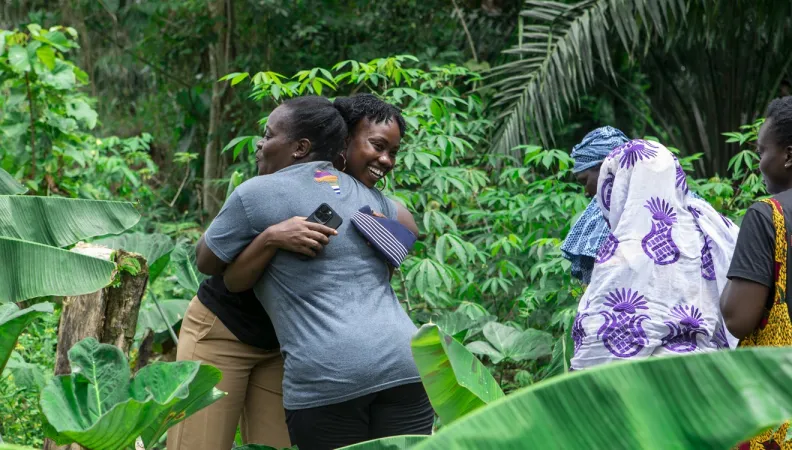Share the page
Fighting for Female Farmers in West Africa
Published on

In Côte d’Ivoire, two-thirds of rural women work in agriculture, but as many as 75% of them live below the poverty line. They also face physical and other forms of violence. For the past three years, the Ivorian League for Women’s Rights has been tackling these problems, and providing support for women, particularly in rural areas. For her work, co-founder Marie-Paule Okri has just received the Simone de Beauvoir Award for Women’s Freedom 2024 in Paris.
What does the Simone de Beauvoir award mean for you?
It’s truly a great honor and a source of great pride that my work is recognized abroad—not just for me, but also for the women I work with. We unfortunately often run into obstacles in our everyday work with women, including verbal aggression. So receiving a prize of this significance allows us to savor our victories, and it reinforces us in our actions.
Like Simone de Beauvoir, I’m a "radical feminist" and proud of it. And I think we must fight evil at its root. Putting an end to the oppression of women can come about only by fighting patriarchy.
In 2020, you co-founded the Ivorian League for Women’s Rights. As an agronomist, what actions do you carry out with women farmers in Côte d’Ivoire?
We’ve set up and developed agricultural training in several villages, on ecological methods, marketing crops, finding financing to buy equipment, and other themes. In Vavoua for instance, in west-central Côte d’Ivoire, we helped women form a cooperative and negotiated to acquire land.
Are women being denied access to land?
Yes. Even though women legally have the right to access land like men, in reality we face refusal – even for renting land. We fought against this and got results: when the village chief saw our first harvest, he offered to part with a plot of land. So, while there is progress, there’s still a long way to go, and it’s up to the political powers to take action.
In the south of the country, we work with women who established a cooperative but lacked technical and financial resources. As they don’t have land to farm yet, they’re focusing on agricultural processing by making things like doughnuts from cassava or ginger syrup.
The money these women farmers earn enables them to pay school tuition for their daughters – not just for their boys. Before, they often had to choose which children to send to school.
Find out more: Burundi: Setting up school canteens to stop kids from dropping out
In your opinion, is the economic empowerment of women an effective means of preventing the violence they suffer?
Yes, unfortunately that’s the baseline. I say “unfortunately” because a woman’s freedom or respect should not depend on her resources. But of the hundred or so female victims of violence who have contacted us, at least 90 can’t leave their homes because they can’t afford another home, or even to go to the hospital.
Beyond economic independence, a general change in mentality is also needed, because patriarchy is a deeply rooted system. Even if they become successful socially, most women think they haven’t made a success of their lives if they’re not married.
Have you yourself encountered any obstacles in your career, as a woman?
Yes, I’ve often been told that agronomy is a man’s job and that it requires physical strength to practice it. But agronomy is a science and above all requires a thought process to find solutions for farmers.
However, as a female agronomist I can inspire the young girls I meet in schools. Seeing me, they understand that they too can practice such a profession and put their intellectual abilities at the service of their convictions.
And thanks to this prize, they realize how far I’ve come and the recognition this work has given me.
The Ivorian League for Women’s Rights is an organization supported by AFD as part of the Support Fund for Feminist Organizations
